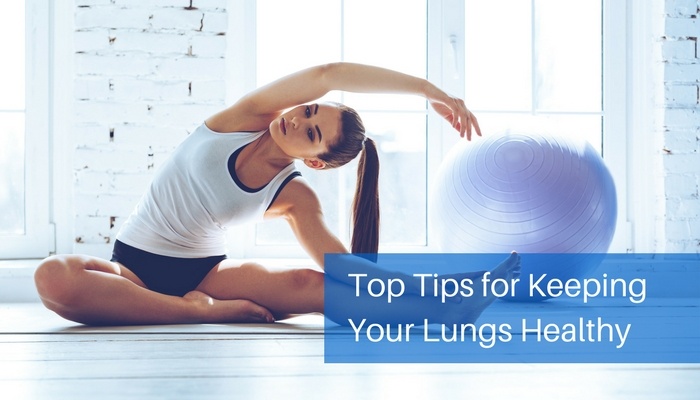
This time of year, many people are considering resolutions, and looking for ways to improve their lives. From weight loss to eating more natural foods, from reducing screen time to improving organization, optimism is high as new habits are formed. Many people look for ways to improve health, and even slow down the aging process. One area that is simply overlooked, and even easier to care for, is the respiratory system.
According to the Centers for Disease Control, chronic respiratory disease is the third leading cause of death in the United States. Although not all respiratory diseases can be prevented, there are techniques to maintain your respiratory system, and easy activities (or things to avoid) to keep your lungs healthy. Let’s look at some top tips for keeping your lungs healthy:
1. Don’t Smoke
Today, this message is pretty clear. Cigarette smoking is the number ONE cause of preventable disease and deaths worldwide, and causes:
- Lung cancer (the leading cause of cancer deaths)
- COPD
- Asthma
- Bronchitis
When you smoke, over 7,000 toxic chemicals are inhaled into your body, including carbon monoxide and nicotine, which is the addictive chemical found in cigarettes.
If you do smoke, just stop! Although any addictive habit is tough to break, there are many resources available to smokers wanting to quit. Within 24 hours of kicking the habit, your blood pressure and heart rate immediately lower. Breathing will improve within two weeks, but the damage already done to your lungs is irreversible. Therefore, the sooner you quit, the healthier your lungs will be.
2. Improve Your Posture
Try sitting down, hunched over a pillow, and breathe deeply. It is difficult, isn’t it? Improving your posture is an uncomplicated way to improve your respiratory capabilities, keeping your lungs healthy. A study conducted at the University of Southern California showed that hunching forward can affect lung capacity by as much as 30%.
Combined with sitting for long periods of time, poor posture causes or exacerbates a host of health problems, including:
- Heart disease
- Muscle degeneration
- Leg pain and problems
- Back and neck strain
3. Keep Your Lungs Healthy by Laughing More
Laughing works the abdominal muscles and increase lung capacity. Laughter also clears out your lungs by forcing enough stale air out that it allows fresh air to enter more areas of the lung. Longer exhalations allow for larger quantities of carbon dioxide-rich air to be expelled. More laughter=More oxygen. What a fun way to keep your lungs healthy!
4. Stay Hydrated
We all know that our bodies need water more than anything else. Additionally, hydration has been proved to affect many of our bodies’ processes, directly or indirectly. In terms of lung health, dehydration has several negative effects:
- Helps you clear your lungs better, by thinning the mucous lining
- Can lead to breathing problems, as water is necessary to moisten sinuses an bronchial tubes
- Makes allergies worse by triggering histamine production
Since water is made of two hydrogen atoms and one oxygen atom, you are improving oxygen levels (and keeping your lungs healthy) by merely staying hydrated!
5. Exercise
This may be an obvious choice, but still worth mentioning. Exercise increases the body’s ability to use oxygen and rid itself of carbon dioxide better. The more you participate in cardiovascular exercise, the stronger (and healthier) your lungs will be! Although you may feel short of breath in the initial stages, continuing an exercise regimen will lead to improved lung capacity. There are also benefits to your heart, lowering blood pressure and heart rate, reducing fat and cholesterol in the body, and to improve the body’s ability to take oxygen from the blood.
6. Watch Your Weight
Being overweight can make it harder to breathe and limit activity. Weight can cause shortness of breath, discouraging people from physical exercise. If they have lung disease, many common steroid treatments cause many patients to gain weight, exacerbating the issue.
7. Follow a Healthy Diet, include Foods Which Promote Lung Health
Eating fruits and vegetables rich in nutrients is good for anybody. When filling your grocery cart at the supermarket, there are some choices which go that extra mile to improve lung health:
- Ginger—has anti-inflammatory properties
- Pomegranate—known to slow the growth of tumors, this fruit is full of antioxidants including ellagic acid, which is gaining strides in cancer research
- Apple—delivers flavonoids, vitamin E, and vitamin C
- Grapefruit—the flavonoid Naringin inhibits cancer-causing enzyme and is found in white grapefruit, while pink grapefruit is high in lycopene
- Peppers—capsaicin, which gives chili peppers their heat, may inhibit tumor growth in lung cancer, and B6, found in bell peppers, has been shown to reduce the occurrence of COPD
- Nuts—studies have shown that eating a handful of nuts a day may cut your risk of dying from respiratory disease by half, along with reductions in heart disease and overall cancer risk
A Swedish study found that adults consuming five or more servings of fruits and vegetables each day were 35% less likely to develop COPD than those who ate two or less servings.
8. Exercise Your Lungs
Athletes and those suffering from respiratory illness are not the only people who can benefit from exercising lungs. Respiratory muscle training increases aerobic enzymes and blood flow, improving both endurance and power when performed regularly. The respiratory muscles also strengthen in use throughout your specific athletic movements just like any other muscles, and training your respiratory muscle involves other muscle groups throughout the body, which means that you not only train your lungs, but your core and back. Consider adding a respiratory training device like PowerLung to your everyday schedule to help keep your lungs healthy!

